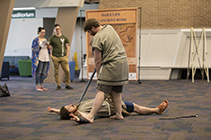Arts and Sciences Gather for "Daily Life in Ancient Rome"
April 9, 2019 | Hannah Gainer | casshcommunications@uwf.edu

"Daily Life in Ancient Rome" was a student-produced, two-day multidisciplinary event that was supported by the University of West Florida’s Department of History. The event welcomed student involvement from disciplines within the arts, sciences and humanities, making it a STEAM-inclusive event. Some of the represented disciplines included marine biology, art, mechanical engineering, history, digital art and bioarchaeology. On March 20 and March 21, University of West Florida undergraduate and graduate students presented research projects and demonstrations of different aspects of ancient Roman culture. Additionally, two members of the UWF Fencing Club staged a gladiatorial combat demonstration.
“This event, ‘Daily Life in Ancient Rome,’ was important for more reasons than just one. It was important to focus on student research projects, to give students a lower-stress opportunity to practice presentation skills, to provide experience in group project management, to reveal an insider's view of the STEM disciplines and the arts to students from both types of disciplines, and to foster appreciation of each other's disciplines,” --- Dr. Marie-Thérèse Champagne, event organizer and producer
The purpose of the two-day event was to spotlight and foster student research from a multidisciplinary perspective from both STEM fields and the Arts, or STEAM through projects, presentations and lectures.
A team from UWF’s Mechanical Engineering program built and demonstrated a Roman ballista on UWF’s intramural fields. The ballista was a capstone project for the group of students. Another group of students in that same program built an earlier type of catapult at this same event last year.
Dr. Jane Caffery is a UWF biology professor. Two of her marine biology undergraduate students presented their research project. Their work focused on ancient Roman salt production, specifically the microorganisms associated with salt production.
Dr. Allysha Winburn is an assistant professor of anthropology. Katy Patterson and Kandiss Campbell, two of Winburn's bioarchaeology grad students, presented parts of each one’s master’s thesis on ancient Roman topics. Patterson’s research examined evidence of osteoarthritis in a sample of imperial-era Roman skeletons from several archaeological sites. Campbell’s research examined patterns of marriage and migration during Imperial Rome.
“Campbell’s research involved biodistance analysis; the identification of anomalous traits throughout the skeleton that are under strong genetic control and that act as a proxy for relatedness,” said Winburn.
Dr. Marie-Thérèse Champagne’s Ancient Roman History class presented their final class projects.
“We are doing these presentations for our final project for our Roman Mediterranean class with Dr. Champagne. She gave us a specific topic and we then had to do research on that topic. Mine was on Roman Slavery, specifically house slaves. We conducted research, produced posters, worked as partners and then gave a five to ten-minute presentation on it. We gave the presentation in costume for full authenticity and it was an interesting research project,” said Tyla Cohen, UWF student.
Art Professor Marzia Ransom's Interdisciplinary Honors class demonstrated Roman fresco techniques as well as Renaissance techniques and learned the process “from the ground up.” They constructed a 4 x 8-foot movable wall and then painted an ancient style fresco. Since the class included both Humanities and STEM majors, it provided an eye-opening experience for all.
Professor Thomas Asmuth's digital art students created 3D-printed and painted commemorative items based on the theme of ancient Rome but with a current connotation. Asmuth's fall 2018 class created those collectibles as a final project in their class. Four designs were selected and those four students created ten of each of their designs this semester, even though the class had ended in December.
The two-day event featured Dr. Greg Aldrete, a classical historian from the University of Wisconsin at Green Bay. Aldrete taught an Honors Core II class, presented both formal and informal talks, spoke to a History Club monthly meeting, and attended the student presentations as well.
“One of the books I’ve written is ‘Daily Life in the Roman City,’ so this is my thing. They thought I would be a good person to bring in to interact with the students and be able to comment on their projects and I gave a series of presentations,” said Aldrete.
Aldrete talked about the hazards of living in ancient Rome in one of his lectures. He looked beyond the facade and talked about the dark sides to the city. He also gave an inside look on the floods, fires, famine and disease.
UWF Associate History Professor, Dr. Marie-Thérèse Champagne, said she hopes the audience left the event with three takeaways. First, different disciplines complemented each other and used a multidisciplinary approach that enriched the learning that all experienced. Second, that working across colleges with faculty and students in a variety of STEAM programs fostered collaboration and benefited everyone. Third, that the audience saw the commonalities among all of these fields that are seemly unrelated and that this type of experiential, high-impact learning was exciting and fun.
Dr. Champagne said she believes Dr. Aldrete’s contributions, the Roman fresco creation and interdisciplinary honors class demonstration were the event highlights; however, each participant made a valuable contribution to the overall success of the event.
The event was sponsored by the UWF College of Arts, Social Sciences, and Humanities; the UWF Department of History; and the Askew Institute for Multidisciplinary Studies. It was a collaboration of research and creative activity from STEAM disciplines.
This event was funded by two UWF grants that Champagne earned, a CASSH Faculty Excellence Award and a fellowship with the Askew Institute for Multidisciplinary Studies.






